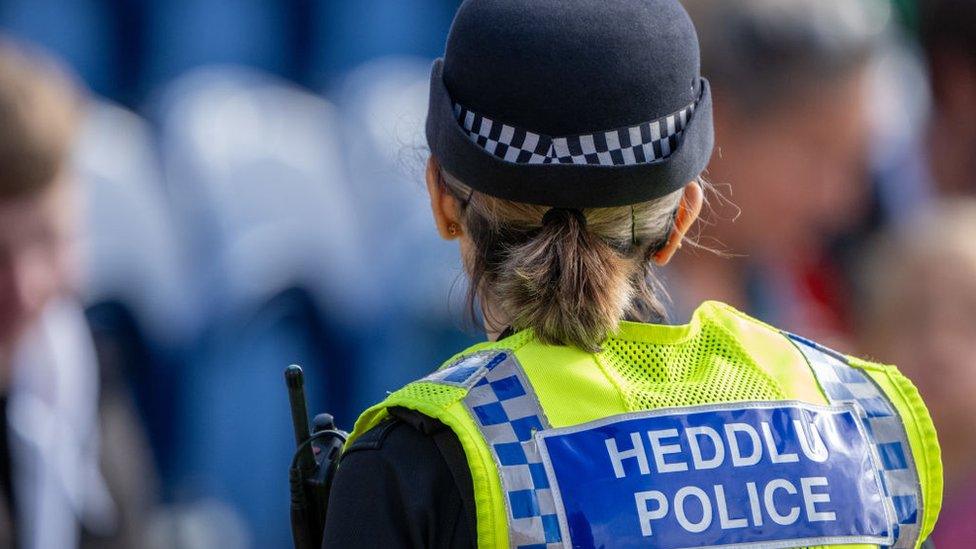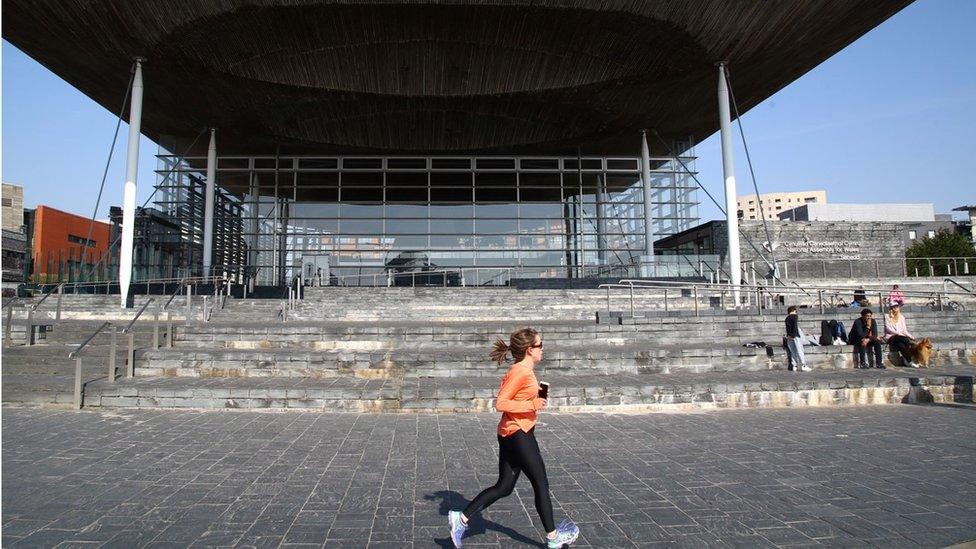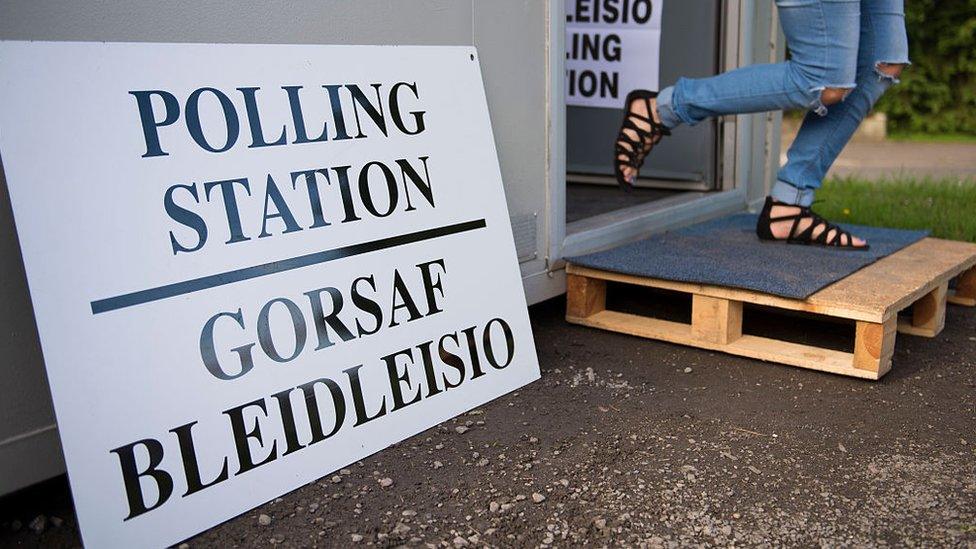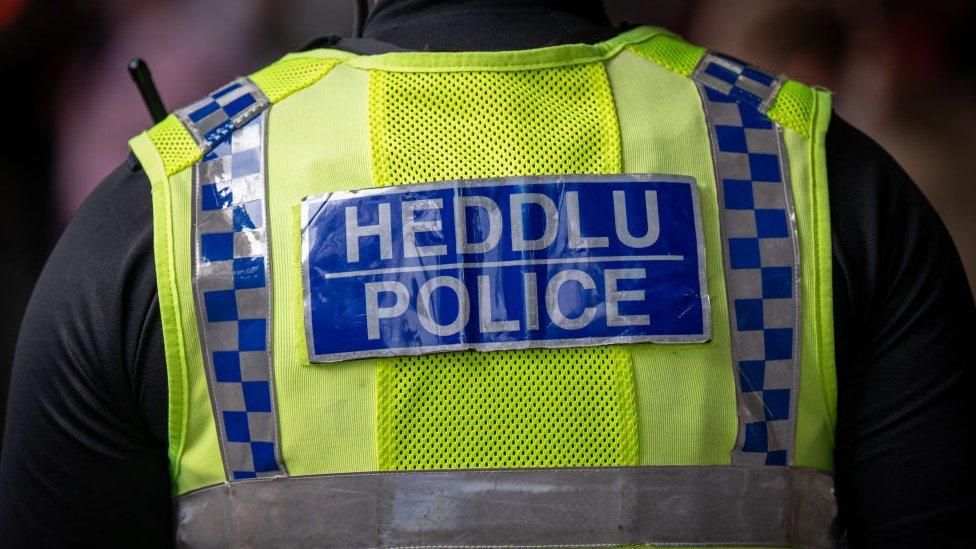Police and crime commissioners: What do they do?
- Published

This will be the fourth set of police and crime commissioner elections
On 2 May police and crime commissioner (PCC) elections will take place across Wales, with candidates from the nation's four main political parties running for office.
Turnout at the previous two PCC elections in Wales has been comparatively high, if not pretty impressive.
Police and crime commissioners were established 12 years ago, but it's probably fair to say many of us have a slightly hazy understanding of what they are.
With polling stations opening in just over a fortnight, now is probably as good a time as any to refresh our memories on all this.
Why do we have police and crime commissioners?
The first PCCs were first elected in 2012, under David Cameron's UK government of the time, in Wales and most of England.
The change did not affect Scotland and Northern Ireland, where policing matters are devolved to the governments there.
The stated aim was to make police forces more accountable and responsive to the areas they serve, to bring a "public voice" to policing.
PCCs replaced police authorities, which had become "remote and invisible, without the capability and the mandate to insist on the priorities of local people", according to the Home Office.
What do police and crime commissioners do?
PCCs are elected officials whose role is to help ensure that police forces function effectively, but not to run those forces themselves.
That point is worth emphasising. They are not in charge of day-to-day decision-making.
The operational independence of police forces is protected by law.
The PCCs' job is to hold police forces to account, to scrutinise their performance on behalf of the public they serve.
They appoint chief constables and can dismiss them, if required.
They also set the annual budget for their force and decide the level of the slice of council tax which is dedicated to police funding, known as the police precept.
Commissioners are intended to be a link between officers and communities, consulting local people, councils and other bodies and to ensure that police funding is spent wisely.
PCCs also oversee community safety and set out force strategy and policing priorities in a Police and Crime Plan.

Turnout at the last two police commissioner polls were boosted by coinciding with Senedd elections
How many commissioners will Wales elect on 2 May?
Four police and crime commissioners will be elected, one for each of the police forces - Dyfed-Powys, Gwent, South Wales and North Wales.
The four main political parties in Wales - the Liberal Democrats, Plaid Cymru, the Conservatives and Labour Party - are standing candidates in each area.
These elections will use the traditional voting system used to elected MPs at Westminster, known as first-past-the-post.
Voters will choose a single candidate and whichever one gets the most votes will win.
This is a change from previous PCC polls, where the supplementary vote system, external was used, with voters marking the ballot paper with a first and second choice of candidate.
Are there any other changes to the process this time?
Yes, a very important change. Voters will need ID to be able to cast their ballot, unlike previous elections.
Accepted forms of ID include a British passport, a driving licence, a 60 and over Welsh concessionary travel card, a disabled person's Welsh concessionary travel card, or an identity card bearing the proof of age standards scheme (a PASS card).
Voter ID now applies in UK government-run elections, including general elections for Westminster.
What happened at the previous elections?
The elections were due to happen in 2020 but were postponed by a year due to the pandemic.
Labour's Andy Dunbobbin won the North Wales election, meaning that with the re-election of Jeff Cuthbert in Gwent and Alun Michael in South Wales the party took three of the four positions.
Plaid Cymru's Dafydd Llywelyn was re-elected in Dyfed-Powys.
Do PCCs earn much?
Yes. The larger the police force the higher the salary. Currently in South Wales Alun Michael is paid £86,700 a year.
Jeff Cuthbert, in Gwent, receives £73,302, while Andy Dunbobbin, in North Wales, is on £73,300.
Dafydd Llywelyn, in Dyfed-Powys, has an annual salary of £68,200.

Voter ID will be needed for the first time in elections in Wales
Who is running this time?
Both Mr Cuthbert and Mr Michael are standing down at this election, so we will have at least two new PCCs in Wales next month.
Dyfed-Powys
Justin Griffiths, Welsh Liberal Democrats
Ian Harrison, Welsh Conservatives
Dafydd Llywelyn, Plaid Cymru
Philippa Ann Thompson, Welsh Labour
Gwent
Donna Cushing, Plaid Cymru
Mike Hamilton, Welsh Liberal Democrats
Hannah Jarvis, Welsh Conservatives
Jane Mudd, Welsh Labour
North Wales
Andy Dunbobbin, Welsh Labour
Ann Griffith, Plaid Cymru
Brian Jones, Welsh Conservatives
David Richard Marbrow, Welsh Liberal Democrats
South Wales
Sam Bennett, Welsh Liberal Democrats
George Carroll, Welsh Conservatives
Dennis Clarke, Plaid Cymru
Emma Wools, Welsh Labour
What sort of turnout should we expect?
Turnout was pretty respectable at the last two PCC elections in Wales, which took place at the same time as Senedd elections.
In 2016, Wales force areas had the highest turnout in England and Wales - Dyfed-Powys (48.9%), South Wales (46.6%), North Wales (41.6%) and Gwent (39.4%).
The lowest turnouts were Durham (17.4%), Cleveland (19.7%) and Leicestershire (19.8%).
Similarly, in 2021 the highest turnout was in Dyfed-Powys (50.6%), North Wales (45.4%), South Wales (43.9%) and Gwent (41%).
But this time, unlike in England where there are local elections, Wales' PCC elections are happening on their own.
This happened previously at the first police commissioner polls in 2012. The turnout then was just 14.9% across Wales.
Throw into the mix the fact that voter ID will be required for the first time and it's probably reasonable to expect Wales to be lower in the 2024 turnout league table than it has been in the past eight years, and potentially very low.


- Published10 April 2024
- Published5 December 2023
